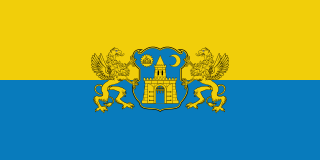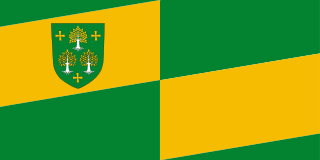Elections in Hungary are held at two levels: general elections to elect the members of the National Assembly and local elections to elect local authorities. European Parliament elections are also held every 5 years.

Dunakeszi is a city in Pest county, Budapest metropolitan area, Hungary. It is located to the north of Budapest on the left bank of the Danube.

Gergely Szilveszter Karácsony is a Hungarian politician, political scientist and current Mayor of Budapest. He previously served as member of the National Assembly (MP) from 2010 to 2014 and Mayor of Zugló from 2014 to 2019.
Local elections took place on 3 October 2010 to elect mayors and the composition of municipal bodies of Hungary's 3,176 settlements. Voters also elected the total of 424 members of the county assemblies and the General Assembly of Hungary, besides 16,914 local government representatives.

The General Assembly of Budapest is a unicameral body consisting of 33 members, which consist of the 23 mayors of the districts, 9 from the electoral lists of political parties, and the Mayor of Budapest. Each term for the mayor and assembly members lasts five years.

District V is the heart of Budapest and the political, financial, commercial and touristic center of Hungary. The name of the district is Belváros-Lipótváros, which refers to the two historical neighbourhoods that is located in the district; Belváros and Lipótváros . Inner City is the old town of Pest, while Leopold Town was established in the early 19th century, and became the political and financial centre of Hungary in the early 20th century when the Hungarian Parliament was built. The two neighbourhoods were originally the 4th and 5th districts of Budapest until 1950 when the two districts were merged and number IV was given to Újpest.

The 1st District of Budapest is the Castle District and is the historical part of the Buda side of Budapest. It consists of the Buda Castle Hill and some other neighborhoods around it, like Tabán, Krisztinaváros and parts of Gellért Hill.

Terézváros is the District VI of Budapest, and was named after Queen Maria Theresa in 1777, who visited the neighbourhood 26 years earlier in 1751. The territory was first inhabited in the early 18th century when the old town of Pest was already fully built, so that people had to inhabit lands outside the city. Terézváros was one of the ten districts that were formed when the city of Budapest was created in 1873.
Today Terézváros is the second in population density after the neighbouring Erzsébetváros. Terézváros is meanwhile the second smallest district. Both districts are famous for their night life.

The 2nd district of Budapest is a district of Budapest, Hungary. It has an area of 36.34 km² and is situated to the south of the 3rd district and to the north of the 1st district and the 12th district.

The Mayor of Budapest is the head of the General Assembly in Budapest, Hungary, elected directly for 5-year term since 2014. Until 1994 the mayor was elected by the General Assembly. The office was called Chairman of the Council of Budapest between 1950 and 1990, during the Communist period.

The Lord Mayor of Budapest was a former political position, existed between 1873 and 1944 in Budapest, the capital of Hungary. The Lord Mayor was representative of the Hungarian government as head of the capital's municipal authority, similarly to the Lord-Lieutenants of Counties.

The 2014 Budapest mayoral election was held on 12 October 2014 to elect the Mayor of Budapest (főpolgármester). On the same day, local elections were held throughout Hungary, including the districts of Budapest. The election was run using a First-past-the-post voting system. In contrast with previous elections where the Mayor served a 4-year term, the winner of this election served for 5 years.

The 2019 Budapest mayoral election was held on 13 October 2019 to elect the Mayor of Budapest (főpolgármester). On the same day, local elections were also held throughout Hungary, including the districts of Budapest which will determine the composition of the General Assembly. The election is run using a first-past-the-post voting system. The winner of the election will serve for a term of five years.
Local elections were held in Hungary on 13 October 2019. Mayors and assembly members were elected for a term of 5 years.

The 2010 Budapest mayoral election was held on 3 October 2010 to elect the Mayor of Budapest (főpolgármester). On the same day, local elections were held throughout Hungary, including the districts of Budapest. The election was run using a First-past-the-post voting system. The winner of this election served for 4 years.

The 2006 Budapest mayoral election was held on 1 October 2006 to elect the Mayor of Budapest (főpolgármester). On the same day, local elections were held throughout Hungary, including the districts of Budapest. The election was run using a First-past-the-post voting system. The winner of this election served for 4 years.

The 2002 Budapest mayoral election was held on 20 October 2002 to elect the Mayor of Budapest (főpolgármester). On the same day, local elections were held throughout Hungary, including the districts of Budapest. The election was run using a First-past-the-post voting system. The winner of this election served for 4 years.

The 1998 Budapest mayoral election was held on 18 October 1998 to elect the Mayor of Budapest (főpolgármester). On the same day, local elections were held throughout Hungary, including the districts of Budapest. The election was run using a First-past-the-post voting system. The winner of this election served for 4 years.

Gábor Staudt is a Hungarian jurist and politician of the right-wing Jobbik. He served as a member of the National Assembly (MP) from 2010 to 2019. He was the Jobbik's candidate for the position of mayor of Budapest in the 2010 and 2014 local elections.
The electoral system of Hungary is the set of voting methods and rules used in Hungary, including mainly the system for electing members of the National Assembly : and local government elections. The Hungarian electoral system also includes the systems used for the European Parliament elections held in Hungary and the elections of minority local government elections, as well as the rules of referendums and similar initiatives. The president of the republic is not directly elected.














